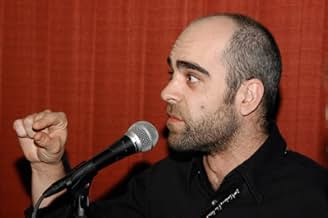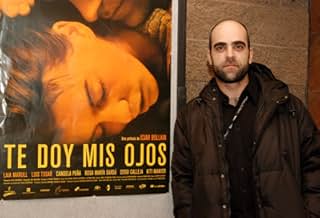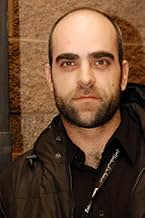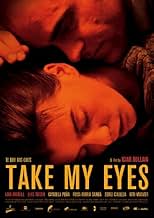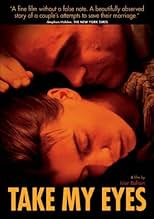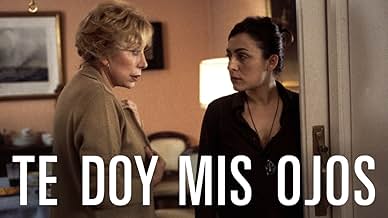IMDb RATING
7.4/10
7.8K
YOUR RATING
One winter night, Pilar runs away from home. With her, she takes only a few belongings and her son, Juan. Antonio soon sets out to look for her. He says Pilar is his sunshine, and what's mor... Read allOne winter night, Pilar runs away from home. With her, she takes only a few belongings and her son, Juan. Antonio soon sets out to look for her. He says Pilar is his sunshine, and what's more, "She gave him her eyes"...One winter night, Pilar runs away from home. With her, she takes only a few belongings and her son, Juan. Antonio soon sets out to look for her. He says Pilar is his sunshine, and what's more, "She gave him her eyes"...
- Awards
- 42 wins & 17 nominations total
Rosa Maria Sardà
- Aurora
- (as Rosa María Sardá)
Kiti Mánver
- Rosa
- (as Kiti Manver)
David Mooney
- John
- (as Dave Mooney)
- Director
- Writers
- All cast & crew
- Production, box office & more at IMDbPro
Featured reviews
The best I can say in favor of this film is that I came out of the cinema with terrible back pain because I had been so extremely tense while watching it. The actors are absolutely brilliant, communicating all that needs to be told, and the plot is never simplistic.
Most European social cinema seems influenced by Ken Loach's movies and this one is no exception. The way time passes slowly and characters try hard to improve their situation reminds a lot of Loach's "Sweet Sixteen", among others.
If there is any weakness to the movie is that I can't say if people who do not share the director's opinions on gender violence would appreciate this movie as much as I have.
Most European social cinema seems influenced by Ken Loach's movies and this one is no exception. The way time passes slowly and characters try hard to improve their situation reminds a lot of Loach's "Sweet Sixteen", among others.
If there is any weakness to the movie is that I can't say if people who do not share the director's opinions on gender violence would appreciate this movie as much as I have.
From beginning to end this movie is a sea of tension, mostly generated by Pilar's (Laia Marull) stunning fear gestures, and by Antonio's (Luis Tosar) volatile state, leaving the spectators breathing heavily in awe.
With great performances by the entire cast, a solid and incredibly realistic script, an amazing score, and shot in the beautiful town of Toledo, this production grabs you right from the start. Even when the story isn't as disturbing as 'Once Were Warriors (1994)' the characters develop a three dimensional presence to the point of being as complex as a real couple in a self-destructive relationship creating such a drama, that tends to be more psychological than physical.
And even when the conclusion does not represent a drastic overcome, it stands as an example of courage and self determination that will, in deed, prevail in the mind of the viewer, and even more in those who find themselves in the same situation as the protagonist. Kudos to Miss Bollain, this is a good movie, be sure not to miss it.
With great performances by the entire cast, a solid and incredibly realistic script, an amazing score, and shot in the beautiful town of Toledo, this production grabs you right from the start. Even when the story isn't as disturbing as 'Once Were Warriors (1994)' the characters develop a three dimensional presence to the point of being as complex as a real couple in a self-destructive relationship creating such a drama, that tends to be more psychological than physical.
And even when the conclusion does not represent a drastic overcome, it stands as an example of courage and self determination that will, in deed, prevail in the mind of the viewer, and even more in those who find themselves in the same situation as the protagonist. Kudos to Miss Bollain, this is a good movie, be sure not to miss it.
This movie takes a brutally honest approach at the tragic reality of spousal abuse. This topic has been addressed before, but this movie deals with the subject matter better than any other I can recall seeing.
An effective performance by Luis Tosar, as the abusive husband Antonio, develops the layers of emotions in this imposing and frightening character in an effort to understand why this violence is occurring. While certainly not presenting an advocate's position to defend his cruel and vicious behavior, the film also resists the temptation of exploiting the volatile outbreaks. The film shows degrading speech and physical battery to the wife, while not going overboard with bloody, gory attack just for their own sake. He attends support groups to discuss with a psychologist and other abusers the root causes of the action, and makes a sincere effort to change his ways. Gradually, the motivations for his irrational action, although becoming clearly understood, are still properly advanced as totally unacceptable.
Laia Marull, as the abused wife, is not stereotyped, either. She is shown as an intelligent and capable person, making an honest effort to confront the situation, while struggling with the conflict of somehow preserving the marriage. There are many artistic metaphors about the passion of their marriage reflecting the very problem they are dealing with. I also like the wife's museum tour presentations, where she is clearly talking not only of the paintings, but of her own aspirations. Both of the principals are splendid in their roles, especially in their interaction with one another.
Much could be written of the rich double-layered symbolism of several other scenes. Suffice it to say this is a beautifully done movie with an ending, that in all its simplicity, took me by surprise. It was the proper ending, too, I think, for reasons you will understand when you see the movie. Definitely worth viewing.
An effective performance by Luis Tosar, as the abusive husband Antonio, develops the layers of emotions in this imposing and frightening character in an effort to understand why this violence is occurring. While certainly not presenting an advocate's position to defend his cruel and vicious behavior, the film also resists the temptation of exploiting the volatile outbreaks. The film shows degrading speech and physical battery to the wife, while not going overboard with bloody, gory attack just for their own sake. He attends support groups to discuss with a psychologist and other abusers the root causes of the action, and makes a sincere effort to change his ways. Gradually, the motivations for his irrational action, although becoming clearly understood, are still properly advanced as totally unacceptable.
Laia Marull, as the abused wife, is not stereotyped, either. She is shown as an intelligent and capable person, making an honest effort to confront the situation, while struggling with the conflict of somehow preserving the marriage. There are many artistic metaphors about the passion of their marriage reflecting the very problem they are dealing with. I also like the wife's museum tour presentations, where she is clearly talking not only of the paintings, but of her own aspirations. Both of the principals are splendid in their roles, especially in their interaction with one another.
Much could be written of the rich double-layered symbolism of several other scenes. Suffice it to say this is a beautifully done movie with an ending, that in all its simplicity, took me by surprise. It was the proper ending, too, I think, for reasons you will understand when you see the movie. Definitely worth viewing.
8Nzup
There are for sure many other films dealing with domestic violence, but I bet no one is better than this one.
This is something that is said to happen quite often in Spain and the movie was shot in order to sensitize people for this issue and to bring to talk about it. It is the story of an ill jealous man, full of complex of inferiority, terrorizing his wife and son.
I loved the love scene between both, where he makes her repeat that she gives all her body to him (Te doy mis ojos, te doy mi boca etc.). It shows perfectly the mental state of the husband who sees his wife as his property.
This was as well an excellent performance of Laia Marull and Luis Tosar.
This is something that is said to happen quite often in Spain and the movie was shot in order to sensitize people for this issue and to bring to talk about it. It is the story of an ill jealous man, full of complex of inferiority, terrorizing his wife and son.
I loved the love scene between both, where he makes her repeat that she gives all her body to him (Te doy mis ojos, te doy mi boca etc.). It shows perfectly the mental state of the husband who sees his wife as his property.
This was as well an excellent performance of Laia Marull and Luis Tosar.
I've already seen this film twice and the subsequent viewing has not diminished much director Iciar Bollain's powerful treatment of domestic violence. In fact, I was actually reluctant to see it again because its potent portrayal of spousal abuse was too disturbing.
There are two things notable about this film that make it stand out from other films on the same subject. One is that it features almost no violence. In fact, there is only one full-blown case of abuse portrayed, and it is less about physical abuse than it is humiliation and emotional abuse.
Another is the nuanced portrayal of the abusive husband. For this, credit must go to actor Luis Tosar, who portrays Antonio. Although the film does its best to give a more balanced portrayal by showing that Antonio does go to therapy and makes some attempt to change his ways, it is Tosar's performance that brings out his human side.
It would have been easy for Tosar to have demonized Antonio, particularly since the actor already a scary appearance, what with his bushy eyebrows and deep-set eyes. But Tosar chooses to take the high road in his performance, focusing on Antonio's deep-seated insecurity and inferiority complex, which are the roots of his violence towards his wife.
His most notable scene is the last one in the film when his wife finally leaves him. As she and her friends go around the apartment packing up her things, the expression on his face is not one of anger but of incomprehension.
But equal credit should be given to Laia Marull, who portrays the wife, Pilar. Because of her performance, the filmmakers literally do not have to show much violence. The literally palpable fear she shows when Antonio is about to go into once of his rages makes that unnecessary.
The film also shows the sexual bond between Pilar and Antonio in order to explain why she continues to return to him despite his abusive behavior, through a frank sex scene that would be possible only in Europe, since American movie makers seem averse to that kind of frankness.
Te doy mis ojos is difficult to watch at times, because of the intensity of its emotional violence. But it is ultimately rewarding for the insights it gives on spousal abuse and the relationship between abusive husband and abused wife.
There are two things notable about this film that make it stand out from other films on the same subject. One is that it features almost no violence. In fact, there is only one full-blown case of abuse portrayed, and it is less about physical abuse than it is humiliation and emotional abuse.
Another is the nuanced portrayal of the abusive husband. For this, credit must go to actor Luis Tosar, who portrays Antonio. Although the film does its best to give a more balanced portrayal by showing that Antonio does go to therapy and makes some attempt to change his ways, it is Tosar's performance that brings out his human side.
It would have been easy for Tosar to have demonized Antonio, particularly since the actor already a scary appearance, what with his bushy eyebrows and deep-set eyes. But Tosar chooses to take the high road in his performance, focusing on Antonio's deep-seated insecurity and inferiority complex, which are the roots of his violence towards his wife.
His most notable scene is the last one in the film when his wife finally leaves him. As she and her friends go around the apartment packing up her things, the expression on his face is not one of anger but of incomprehension.
But equal credit should be given to Laia Marull, who portrays the wife, Pilar. Because of her performance, the filmmakers literally do not have to show much violence. The literally palpable fear she shows when Antonio is about to go into once of his rages makes that unnecessary.
The film also shows the sexual bond between Pilar and Antonio in order to explain why she continues to return to him despite his abusive behavior, through a frank sex scene that would be possible only in Europe, since American movie makers seem averse to that kind of frankness.
Te doy mis ojos is difficult to watch at times, because of the intensity of its emotional violence. But it is ultimately rewarding for the insights it gives on spousal abuse and the relationship between abusive husband and abused wife.
Did you know
- TriviaLaia Marull said her role in this film is the one that has marked her career the most. "It was a very intense movie. I remember the scene in which my character is undressed by his partner and urinates on the balcony. It was a very emotional scene. Working with Luis Tosar is very easy because you look into his eyes and he gives you everything," Marull said. For his part, Tosar revealed a secret about that scene: "When we filmed the scene on the balcony, in which she pees on herself out of fear, I remember being with a sponge between her legs, helping her squeeze it so that the trickle would fall out."
- ConnectionsReferenced in Spanish Movie (2009)
- SoundtracksFarewell To Gibraltar
Canción popular escocesa
- How long is Take My Eyes?Powered by Alexa
Details
- Release date
- Country of origin
- Official site
- Language
- Also known as
- Take My Eyes
- Filming locations
- Production companies
- See more company credits at IMDbPro
Box office
- Gross US & Canada
- $30,496
- Opening weekend US & Canada
- $6,440
- Mar 19, 2006
- Gross worldwide
- $6,098,633
- Runtime1 hour 49 minutes
- Color
- Sound mix
- Aspect ratio
- 1.85 : 1
Contribute to this page
Suggest an edit or add missing content

![Tráiler [OVS]](https://m.media-amazon.com/images/M/MV5BNDFiNzRhYTMtODVmNy00OWQ0LTkwMzAtYjRiNGZmNTk4YjhhXkEyXkFqcGdeQXRyYW5zY29kZS13b3JrZmxvdw@@._V1_QL75_UX500_CR0)


